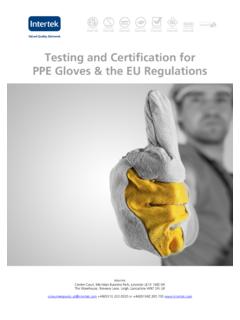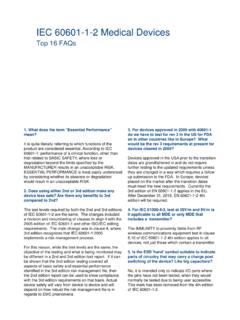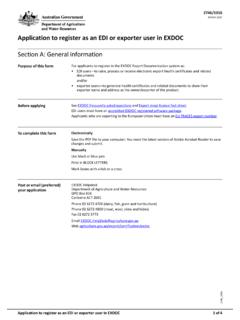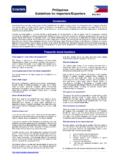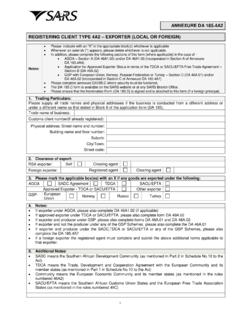Transcription of DETAILED EXPORTER AND IMPORTER UIDELINES - Intertek
1 GTS-PM-KPV-EIG-DEG-11 Page 1 of 9 KENYA BUREAU OF STANDARDS PRE-EXPORT VERIFICATION OF CONFORMITY TO STANDARDS ISSUED: 01-Feb-15 THE REPUBLIC OF KENYA EXPORTER AND IMPORTER GUIDELINES DETAILED EXPORTER AND IMPORTER GUIDELINES INTRODUCTION The Kenyan Bureau of Standards (KEBS), a statutory organization of the government of Kenya, is responsible for the adoption and application of Standards for both imported and domestically manufactured products in the Kenyan market. With effect from 29th September 2005, KEBS implemented the Pre-Export Verification of Conformity (PVoC) to Standards Programme. This is a conformity assessment and verification procedure applied to specific Goods/ Products at the respective exporting countries, to ensure their compliance with the applicable Kenyan Technical Regulations and Mandatory Standards or approved equivalents. KEBS has appointed Intertek as one of the Agents to operate the PVoC program on its behalf, depending on the country of supply.
2 The applicable countries of operation for Intertek , Zones of Responsibility, are listed in Appendix A of this document. All consignments subject to PVoC must obtain a Certificate of Conformity (CoC) issued by PVoC Agent operated and managed by authorized KEBS PVoC Agents, prior to shipment. The Certificate is a mandatory Customs Clearance document in Kenya; consignments arriving at Kenyan Ports without this document may be denied entry into the country. Any regulated product shipments arriving at the port of entry without a CoC will be subjected to destination inspection at a fee equivalent to 15% of the CIF value of the shipment. The IMPORTER will be further required to execute a redeemable bond of a similar amount pending quality verification. All other expenses incurred at destination will be borne solely by the IMPORTER . GENERAL OUTLINE OF THE OPERATIONS OF THE PVOC PROGRAMME Over the years, KEBS has been undertaking conformity assessment of both locally manufactured and imported goods as part of its mandate in implementation and enforcement of Kenya standards through the Quality Assurance, and Import and Export Department.
3 However, verification of imported goods was hitherto restricted to post-shipment verification. This not only led to delays at the port of entry, but also laid on KEBS a heavy responsibility of ensuring that substandard goods are re-exported or destroyed in an environmental friendlier manner. To curb some of these problems, KEBS has put in place PVoC programme to ensure that selected goods are verified for conformity to relevant Kenya standards or approved equivalents before shipment to Kenya. The primary objective of the programme is to ensure quality of products, health and safety, and environmental protection for Kenyans and this is reflected in the product coverage scope. The key elements undertaken in PVoC are: Physical inspection prior to shipment, Sampling, testing and analysis in accredited laboratories, Audit of product processes, Documentary check of conformity with regulations; and Assessment of conformity to standards PRINCIPLES OF THE PROGRAMME The PVoC Programme is based on Article 5 of Technical Barriers to Trade (TBT/WTO), which requires that technical requirements ( Standards) applied to foreign products must also be applied to domestically manufactured products.
4 Since PVoC is a conformity assessment process to verify that products imported to Kenya are in compliance with the applicable Kenya standards or approved equivalents, regulations and technical requirements before shipment, it is the sole responsibility of the supplier ( EXPORTER ) to demonstrate the same and hence meet any associated costs of verification. GTS-PM-KPV-EIG-DEG-11 Page 2 of 9 KENYA BUREAU OF STANDARDS PRE-EXPORT VERIFICATION OF CONFORMITY TO STANDARDS ISSUED: 01-Feb-15 THE REPUBLIC OF KENYA EXPORTER AND IMPORTER GUIDELINES DETAILED EXPORTER AND IMPORTER GUIDELINES HOW TO OBTAIN A CERTIFICATE OF CONFORMITY The PVoC compliance procedures are designed to provide maximum flexibility to Exporters and importers by providing three (3) possible routes for obtaining a Certificate of Conformity (CoC) for their shipments. The method utilized will depend on the frequency of the EXPORTER s shipments to Kenya and the level of compliance they are able to demonstrate initially when applying for certification.
5 Request for Certification The electronic Import Declaration Form (IDF) data which is made available to the PVoC Agent(s) by KEBS will be utilized by the PVoC Offices in the country of supply to contact the Exporters and provide then with a Request for Certification Form (RFC) if the products exported by them are regulated. The EXPORTER must send the completed RFC form along with a copy of the IDF, Proforma Invoice and provide information about the date and place for inspection. In addition, the EXPORTER should include the test reports (if available) and where applicable copies of the Statements of Registration and/or Licence. Determination of Route The PVoC Office will review the RFC and attached documentation and will confirm the applicable route for certification and the applicable standards/regulatory requirements. Product Testing Wherever possible, the PVoC Offices shall arrange for product sampling and testing with an approved or an ISO/IEC 17025 accredited laboratory in advance of the scheduled date of shipment.
6 The Exporters should wait for test results before proceeding with the dispatch of their shipment. Where the EXPORTER wishes to provide test certificates, these should be from a laboratory accredited to an ISO/IEC system or other approved laboratories. The EXPORTER may also make arrangements to have the tests witnessed by a PVoC Office staff. Test reports should be submitted to the PVoC Office along with a copy of the Laboratory Accreditation. The test reports must be sufficiently DETAILED so as to demonstrate traceability to the consignment to be shipped to Kenya. Inspection The PVoC Office will contact the place of inspection and confirm the appointment for physical inspection of the consignment. Physical inspection is normally carried out to verify requirements that may be visually verified ( product labeling) and to ensure reconciliation of the consignment with previously submitted test reports.
7 If applicable, product sampling for testing purposes may also be performed during physical inspection. In such case however, exporters should wait for test results before shipment. Certification Except for air-shipments, the EXPORTER shall submit a final invoice to the PVoC Office as soon as possible after physical inspection. The PVoC Office will perform a final review of all test and inspection reports and decide upon the issuance of the Certificate of Conformity (CoC) or Non-Conformity Report (NCR). PVoC Office will indicate any corrective actions needed prior to the issuance of a Certificate of Conformity. Only if the discrepancy is corrected, a CoC will be issued. GTS-PM-KPV-EIG-DEG-11 Page 3 of 9 KENYA BUREAU OF STANDARDS PRE-EXPORT VERIFICATION OF CONFORMITY TO STANDARDS ISSUED: 01-Feb-15 THE REPUBLIC OF KENYA EXPORTER AND IMPORTER GUIDELINES DETAILED EXPORTER AND IMPORTER GUIDELINES ROUTES FOR CERTIFICATION ROUTE A CONSIGNMENTCERTIFICATION Under Route A, products to be shipped have to be both tested and physically inspected to demonstrate conformity to relevant standards, essential requirements or manufacturer s specification.
8 This Route is open to all products being exported by either traders or manufacturers. This Route is open to any trade party, shipments or products and certification process is as outlined below: Step 1 Submission of Request for Certification (RFC) by the EXPORTER The EXPORTER shall complete and submit RFC form (available on the website) to the respective PVoC Agent s office together with the following documentations: DOCUMENTATION IMPORTANCE Product Data Sheet and/or Product Description Mandatory (to specify the product intended use) Product Technical Specification If Available (from the manufacturer) Proforma Invoice Mandatory Import Declaration Form Mandatory Unique Consignment Reference (UCR) number Where applicable Instruction Manual / Operating Instructions Where applicable Production Data Where applicable (Batch No/Lot No, Size, Manufacturer s Name, Production Date, Expiry Date, etc.) QMS Certificates, Conformity Marks, Safety Marks, National Approval If Available Third Party Test Reports If Available Distributorship/Dealership Agreement If Available (only applicable to manufacturer authorized distributors or dealers) NOTE: Quality and completeness of the above mentioned documentation directly influences time and cost of processing of the order/request.
9 Step 2 Review of Documentation submitted by EXPORTER to the PVoC Agent The concerned PVoC Agent shall review the documentation for completeness and to: ACTION PURPOSE Establish the appropriate Kenya Standard and/or international equivalent Standard application priority to be applied Establish the essential requirements Based on Health and safety hazards as per the Standard Establish product risk profile For purposes of determining level of intervention Prepare inspection and testing instructions See: Step 3 and 4 below And respond to the EXPORTER s request giving details specified below within 48 hours: Missing documents (if any); Essential requirements (as per the identified standard) and the level of intervention ( where testing must be done, the EXPORTER shall be informed); Proposed inspection date and schedule for the EXPORTER s confirmation; any other PVoC related requirements. Any other PVoC related requirements NOTE: Inspection shall be scheduled for a date not later than 3 days from receipt of the missing documents specified in the PVoC Agent s communication to the EXPORTER after reviewing RFC.
10 However, if the RFC was accompanied with all the valid documents specified in Step 1, the inspection shall be scheduled for a date not later than 5 days from receipt of RFC unless the EXPORTER prefers a later date. GTS-PM-KPV-EIG-DEG-11 Page 4 of 9 KENYA BUREAU OF STANDARDS PRE-EXPORT VERIFICATION OF CONFORMITY TO STANDARDS ISSUED: 01-Feb-15 THE REPUBLIC OF KENYA EXPORTER AND IMPORTER GUIDELINES DETAILED EXPORTER AND IMPORTER GUIDELINES Step 3 Consignment Inspection by the Appointed Inspector The inspection shall be carried out as per the instruction prepared in Step 2. The inspection shall focus on marking, packing, product s shelf life (where applicable) and visual product conformity for reconciliation with the test report. Assessment of product functionalities is critical more so where testing is not feasible (See: Step 4 below). Samples shall be drawn and respective packages from which samples are drawn marked appropriately by the inspector for testing.





